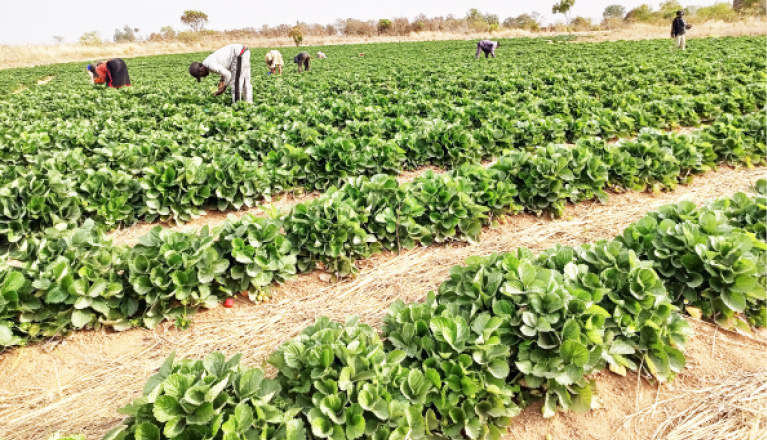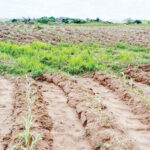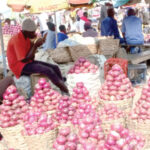Despite facing conflict and environmental challenges, communities in the North-Eastern region of Nigeria now benefit from the shared commitment of Mercy Corps and First City Monument Bank (FCMB) to make a significant difference. Through their partnership and the USAID-funded “Feed the Future Nigeria Rural Resilience Activity”, these institutions promote economic growth, social inclusion, and market resilience. They are transforming the lives of farmers and communities for a more sustainable and prosperous future.
The impactful collaboration, which started in 2021, significantly changes lives in the region by taking bold steps to increase access to financial services through partnerships with major market actors using FCMB’s digital banking platforms. As a result, the economic and living standards of households and communities are changing for the better. One of the partners, FCMB, has successfully deepened financial inclusion and enhanced financial access points by expanding its Agent Banking network to strategic locations across states in the targeted region, enabling farmers to be included in formal economic systems by providing them with education and support to adopt digital tools for a broader range of financial services.
Through these agents, 10,000 smallholder farmers in underserved communities across Adamawa, Borno, Gombe, Yobe, Kebbi, Benue, Ebonyi, and FCT Abuja have been onboarded, benefitting from the USAID-funded COVID-19 mitigation initiative. More impressive is how many women farmers’ clusters are empowered simply by encouraging positive financial behaviours, such as regular savings, budgeting, and accessing loan facilities for business expansion. These women can now contribute economically to their homes and communities, improving living standards and the capacity to cope, adapt and thrive in the face of recurring shocks.
People in Rural Resilience Activity (RRA) target states now participate in simple financial activities like cashless payments, electronic transfers, and remittances. The partnership has also led to a significant increase in bank usage, as evidenced by a recent assessment of programme participants’ banking activities. As of November 2022, 75% and 87.5% of bank accounts in the RRA target areas were still active, compared to only 46.3% in non-RRA areas. These results are an encouraging sign of the positive impact of the partnership and what the future holds.
Shettima renews FG’s commitment to resuscitate ALSCON
No amount of fake news can secure our stolen mandate, says Nasarawa PDP
We all know how devastating the pandemic was, disrupting lives and the economic viability of businesses. By integrating the COVID-19 mitigation response interventions into the RRA work plan, the partnership was able to reduce the shocks and stresses that the pandemic may have worsened. For instance, it increased the adoption of formal bank accounts, boosting financial services and inclusion components. Cash transfers helped beneficiaries become active players in the North East market by investing in small businesses, expanding existing businesses, and diversifying into new ones. Many farmers could also procure and store inputs. Others used the money they received for harvest and post-harvest handling in preparation for dry-season farming.
Another significant impact of the FCMB and Mercy Corps partnership is increased gender-based savings, female financial literacy, and reduced overdependency. For example, in Yola, Adamawa state, a woman used about 60% of the COVID-19 mitigation unconditional cash transfer she received to purchase a manual plough to furrow her family’s fields. To minimise tool downtime and recoup her investment, she rented the equipment to her neighbours, and within two weeks, she purchased four more ploughs for leasing to other farmers.
Agricultural Revitalization and Food Security:
Recognising the critical role that smallholder farmers play in the region’s economy, the partnership focuses on providing training, access to improved agricultural techniques, and resources to enhance productivity. By leveraging FCMB’s financial expertise, farmers gain access to credit facilities and agricultural loans, enabling them to invest in quality seeds, fertilisers, and equipment. This multifaceted approach empowers farmers to increase their yields, diversify their crops, and improve their incomes, ultimately strengthening the food security of communities in North East Nigeria.
Through the Rural Resilience Activity, Mercy Corps negotiated with FCMB to modify its loan terms to enable more farmers to access loans through participating aggregators. These concessions included waiving the standard requirement that mandates loan applicants to save for six months to help the Bank ascertain their financial capacity. FCMB also reduced its loan processing time to 48 hours from receiving all loan documentation. As a result, in 2023, the Bank disbursed loans to 1,000 beneficiaries totalling over N500 million through the Mastercard Foundation revitalisation program to RRA participant farmers and Micro, Small and Medium Scale Enterprises.
Their partnership also meant increased outreach and lower operational costs through local “lead” firms (Aggregators) acting as loan intermediaries and consolidators. At the same time, the RRA strengthened the client base by assisting aggregator firms to build capacity through training for smallholder farmers and SMEs to improve their technical, business management, financial literacy, and other soft skills.
Other achievements include:
Facilitating credit sensitisation workshops to increase the awareness and knowledge of Aggregators and leaders of farmer groups about FCMB products.
Reaching 506,425 people – men and women, youths and persons with disabilities, and internally displaced persons in Nigeria – through partner activities and direct implementation. The Activity has built partnerships with 80 private sector partners, 31 of which have received catalytic grants to scale or expand their businesses in North East Nigeria. This has resulted in 14,453 jobs, facilitated US$53,000,000 in sales and US$15,000,000 in loans by participants. The Activity has also mobilised US$7,000,000 in leverage – monies from private-sector partners.
Providing COVID-19 unconditional cash transfers to 47,387 farmers, 5,560 local MSMEs, and 86 critical intermediary actors in the Feed-The-Future portfolio states of Borno, Yobe, Adamawa, Gombe, Kebbi, Niger, Benue, and Ebonyi, and the FCT for ten months. The cash transfers had the dual aim of helping vulnerable households meet their basic needs and begin reinvesting in economic activities while sustaining and jumpstarting the local economy on which they rely.
Supporting farmers to adopt the best agronomic practices and use support to cultivate over 4300 hectares of land for farming (one hectare per farmer) in the target communities cutting across 23 local governments in Borno, Adamawa, Yobe, and Gombe. They engaged in the production of rice, maise, cowpea, groundnuts, sheep, and goats.
Climate Resilience and Adaptation:
North Eastern Nigeria is particularly vulnerable to the impacts of climate change, with erratic rainfall patterns and prolonged droughts posing significant challenges to agricultural productivity. Mercy Corps and FCMB have responded to this pressing issue by implementing climate-smart farming practices and supporting farmers to adapt to changing climatic conditions. Farmers are equipped to mitigate the effects of climate change and build resilience through water conservation techniques, sustainable land management, and the promotion of drought-resistant crops. The partnership also facilitates access to weather information and early warning systems, enabling farmers to make informed decisions and minimise losses due to extreme weather events. This integrated approach combines traditional knowledge with modern techniques, ensuring the long-term sustainability of agricultural practices in the region.
Financial Inclusion and Rural Development:
Access to financial services remains a significant barrier for rural communities in North East Nigeria. In recognition of the transformative potential of financial inclusion, the partnership has made great strides in expanding access to banking services and empowering individuals with financial literacy. FCMB and Mercy Corps have bridged the gap between rural farmers and formal financial institutions by establishing mobile banking services and promoting digital financial solutions. So far, 19,654 previously unbanked people have become banked under the partnership. This provides farmers a safe place to store their earnings, facilitates savings, and access to credit and insurance products. By enhancing financial capabilities and expanding economic opportunities, the partnership fosters rural development, reduces poverty, and promotes sustainable livelihoods.
Building Local Capacities and Sustainable Institutions:
A distinguishing feature of the partnership between Mercy Corps and FCMB is their commitment to building local capacities and strengthening institutions. By collaborating with local farmers’ cooperatives, community-based organisations, and government agencies, the partnership ensures that interventions are community-led and sustainable. Through training programs and capacity-building initiatives, farmers and local stakeholders are empowered to manage their resources effectively, advocate for their needs, and drive their development. FCMB has integrated a few Agritech companies, such as Agriarche, Extension Africa, Intrio Synergy, Deva Access, and NOMA, operating on its digital banking platform in the North East. This bottom-up approach fosters ownership, resilience, and the long-term success of agricultural initiatives, ensuring that communities have the skills and knowledge to navigate future challenges independently.

 Join Daily Trust WhatsApp Community For Quick Access To News and Happenings Around You.
Join Daily Trust WhatsApp Community For Quick Access To News and Happenings Around You.


